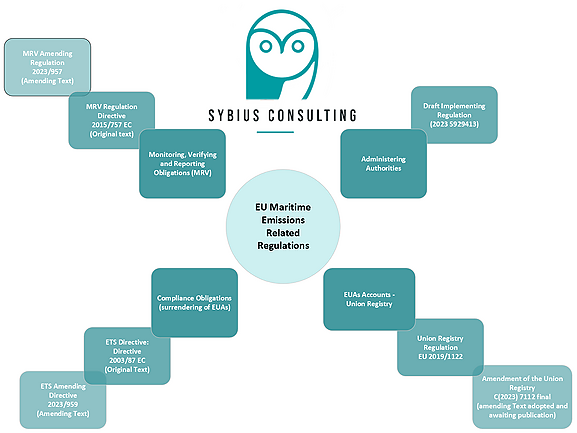Key Insights for Shipping Companies and Charterers:
In 2024, a significant shift in the maritime industry will occur under the new EU maritime emissions rules. Both Shipping Companies and Charterers need to be well-prepared for these changes.
Key Obligations Starting 2024:
-
- Ships Over 5000 Gross Tons: Obligated to monitor, verify, and report extended emissions.
- EU Emissions Trading System (EUAs): 40% of 2024 emissions must be surrendered in 2025.
- Applicability: Regulations apply to voyages starting, ending, or within the EU jurisdiction.
To comply, Shipping Companies will need to acquire European Union Allowances (EUAs) and surrender them by September 2025 for the 2024 emissions.
This process is not just about the cost of EUAs; it involves strategic planning and understanding of financial regulations, particularly EMIR and MiFID II, which will apply to EUAs and their derivatives.
What Does This Mean for Shipping Companies and Charterers?
-
- Acquiring EUAs: There are various methods for Shipping Companies to acquire EUAs. Each has its own risk management and Regulatory implications.
- Passing Costs to Charterers: Shipping Companies can pass the costs to third parties, including Charterers.
- Financial Regulation Impact: Transactions involving EUAs are subject to EMIR and MiFID regulations and this will affect the company’s classification under EMIR and MiFID, both in the UK and the EU.
Understanding BIMCO’s ETS Allowances Clause for Time Charter Parties: A Guide for Owners and Charterers
BIMCO, the world’s largest international shipping association, has introduced a significant clause in Time Charter Parties (TCP) regarding the EU's Emissions Trading Scheme (ETS). Here's what Owners and Charterers need to know:
Responsibilities Under the Clause:
-
- Owner's Role: Responsible for monitoring, verifying, and reporting the greenhouse gases emitted by the Vessel.
- Charterer's Role: Obligated to transfer the EU Emissions Allowances (EUAs) to the Owner’s designated emission account.
BIMCO’s TCP clause creates an EUA forward transaction as it agrees on the delivery of EUAs outside the spot period (2 days)
Financial Regulation Impact:
-
- Emissions Derivatives: Fall under C4 of EU and @UK MiFID; as Over-the-Counter (OTC) Derivatives and they are subject to EU and UK EMIR regulations for parties registered in the EU or UK.
- Reporting to Trade Repositories: as OTC derivatives transactions. Consider if you need to report both sides of the transaction if your counterparty is registered outside your regulatory space (EU or UK)
Key Considerations:
-
- Review MiFID status: OTC Derivatives transactions will affect your Ancillary Activity calculations.
- Review EMIR status: these transactions will need to be included in your Clearing Threshold calculations – remember to actually undertake the calculation or you might be considered NFC+ by default!
Emissions Accounts Uncovered: Trading vs. Maritime Operator
How to choose the right emissions account
Trading Accounts: The Choice for Traders
-
- Eligibility: Open to all individuals interested in trading.
- Account Opening Location: Available in any country.
- In-Country Presence Requirement: Might be needed in the account's country.
- Ability to Surrender Emissions: Not available in these accounts.
Maritime Operator Accounts: Specialized for Maritime Compliance
-
- Eligibility: Tailored for shipping companies subject to ETS obligations or those companies that have taken over the operation of the ship from shipowners and have assumed the ETS obligations.
- Account Opening Location: Restricted to the country of the administering authority.
- In-Country Presence Requirement: No in-country presence needed.
- Ability to Surrender Emissions: Permits the surrendering of emissions.
Quick Guide to the different texts and requirements
Obligations of surrendering: contained in the ETS directive; Directive 2003/87/EC of 13th of October 2003 as amended by Directive (EU) 2023/959 of 10th of May 2023.
Obligations of Monitoring, Reporting and Verification: contained in the MRV Regulation, Regulation (EU) 2015/757 of 29th of April 2015 as modified by Regulation 2023/957 of 10th of May 2023
Maritime Operator Accounts and Trading Accounts: contained in the Functioning of the Union Registry Regulation, Regulation (EU) 2019/1122 and as modified by a proposal of the Commission ARES(2023)5295500
Administering Authorities: rules for attributing an administering authority to a Shipping Company and documents to be presented to assume responsibility for ETS obligations from a shipowner; Draft Implementing Regulation – C(2023) 7112 final

